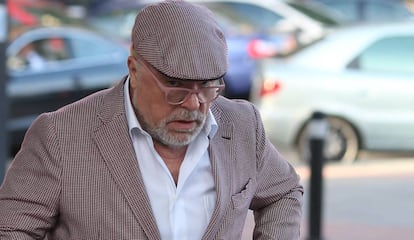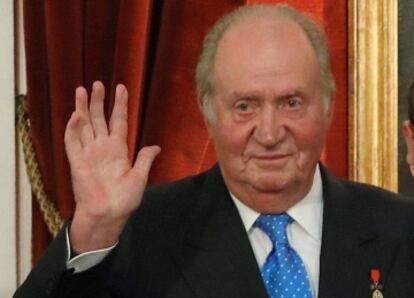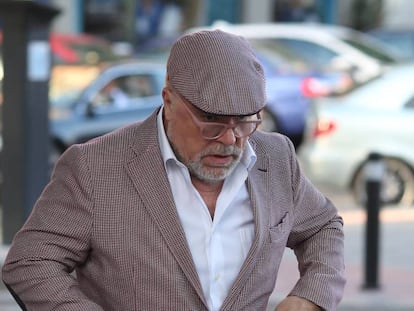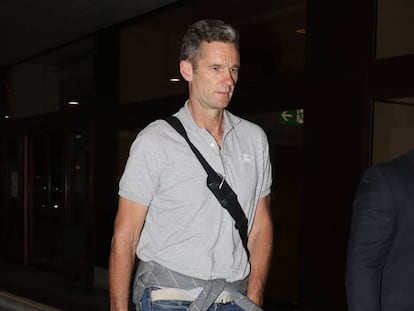High Court judge opens probe into recordings of friend of King Juan Carlos
Investigation will examine claims made by businesswoman Corinna zu Sayn-Wittgenstein that the former monarch used her as a front to conceal assets

A judge from Spain’s High Court has opened up a separate investigation into apparent recordings of a friend of former King Juan Carlos, a businesswoman named Corinna zu Sayn-Wittgenstein, in which she allegedly says that the monarch and his cousin, Álvaro de Orleans y Borbón, used her as a frontwoman to conceal assets abroad. The probe has arisen as part of an ongoing case known as Tándem, in which a former police commissioner, José Manuel Villarejo, is being investigated for bribery of public officials, disclosure of secrets, forgery, money laundering and criminal association.
Investigators will be trying to determine the authenticity or otherwise of the recordings of the former king’s friend
The taped conversations were made in 2015 by Villarejo, and stored electronically. The alleged recordings are between the ex-commissioner himself, Sayn-Wittgenstein, and the former chairman of Spanish telecoms giant Telefónica, Juan Villalonga. After analyzing a police report on the recordings by the Internal Affairs Unit that is investigating the Tándem case, Judge Diego de Egea decided there was evidence that offenses may have been committed, and he has called Villarejo – who is currently being held in pre-trial custody – to appear for questioning on July 26.
Investigators will try to determine the authenticity or otherwise of the recordings of the former king’s friend, during which she is heard to claim that Juan Carlos used her as a front to hide assets abroad, and also complains that the head of the CNI intelligence services is threatening her. She also mentions Swiss bank accounts held by Juan Carlos, and a Swiss lawyer named Dante Canónica who allegedly built a money-laundering structure.

Investigators will also pore over the dates of alleged payments of commissions, to determine whether at the time they were made the former king enjoyed total immunity. Since he abdicated in 2014, Juan Carlos has lost that protection before the law, but he continues to enjoy a status known in Spanish as aforado, meaning he can only be tried by the Supreme Court and not by lower tribunals.
The public prosecutor in charge of corruption cases will have to determine the veracity of accusations made by Sayn-Wittgenstein regarding possible bribery and money laundering related to alleged payments to secure the contract for the construction of the high-speed AVE train link to Mecca, which was headed by a consortium led by around a dozen Spanish companies.
Part of the content of the recordings has already been published in Spanish online media outlets El Español and OK Diario, but the entirety of the conversations is yet to be made public. Sources from the investigation indicate that the tapes not only contain references to possible offenses related to third parties – such as the use of Sayn-Wittgenstein as a front – but also possible offenses committed by the former police commissioner José Manuel Villarejo.
Sayn-Wittgenstein last week told the media that she considered herself “the victim of a smear campaign for political motives,” but she neither confirmed nor denied that it was her voice on the recordings.
Investigators will also try to determine why the recordings were made in the first place– it is currently unknown whether one of the former police commissioner’s clients paid him to tape the conversation, which took place in London, or whether Villarejo acted on his own initiative in order to give himself leverage against the state’s investigation into his own shady business practices.
Investigators will also be trying to determine why the recordings were made
Villarejo will appear before the judge on the same day that the head of Spain’s CNI secret service, Félix Sanz Roldán, will appear on his own request at a closed door meeting in Congress to explain the actions of the intelligence service in relation with Sayn-Wittgenstein.
Villarejo has been in jail since last year after his arrest on suspicion of the aforementioned offenses. He had been operating a “crisis-management” firm that used a network of paid informants in key positions – such as banks or the Spanish Tax Agency – to obtain sensitive information about politicians and others as ammunition to help wealthy clients in distress.
During Operation Tándem, the police seized recordings held by Villarejo, in which he is heard conversing with a number of high-profile personalities. In total they recovered 30 terabytes of files, half of which are encrypted.

“Villarejo wants to turn Operation Tandem into the Corinna case,” said sources familiar with the probe, who described it as a maneuver “to intimidate the state and the state’s institutions.”
The relationship between Sayn-Wittgenstein and the former king was made public as a result of the accident that Juan Carlos suffered in Botswana in 2012, when they were both on a safari. The incident was hugely damaging to the then-king, and was partially behind his surprise decision to abdicate in 2014, making way for his son to become King Felipe VI.
English version by Simon Hunter.









































